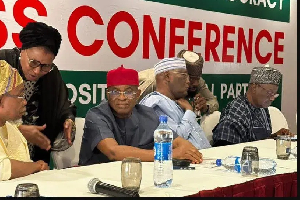The Vice President of Nigeria, Senator Kashim Shettima, has said that country’s $3tn infrastructure investment deficit can be better funded by local stakeholders rather than foreign borrowings.
Shettima said this on Wednesday at the opening ceremony of the third West Africa Capital Market Conference with the theme, ‘Infrastructural Deficit and Sustainable Financing in an Integrated West African Capital Market’ held in Lagos.
The VP who was represented by Dr Tope Fasua, the Special Adviser to the President on Economic Affairs in the Office of the Vice President, said that infrastructural deficit in the West African sub-region means that the capital markets have to improve their operations.
He said, “The centrality of capital markets to Nigeria’s development trajectory, especially to the evolution of our corporate sector, our industries and perhaps most importantly, our infrastructural development cannot be overemphasised. Just two days ago, on Monday, 23rd of October, 2023 at the opening of the 29th Annual Conference of the Nigerian Economic Summit, His Excellency President Bola Ahmed Tinubu sought the cooperation and intervention of Nigeria’s private sector – and specifically the capital market – toward the funding of Nigeria’s $3tn infrastructure gap, which he said should not require 300 years to cover – as propounded in some texts – but 10 years. If this is so for Nigeria, it presupposes that the entire region has similar – or perhaps larger – infrastructural deficits waiting to be filled. They are better filled from inside, not through foreign borrowing alone.
“The job of the capital market in Nigeria is therefore cut out for it. And this extends to West Africa, and Africa at large. This is a time of intense competition among nations and resources, and with the advancement of technology, nations are able to reach into nations with their products, just as businesses have their fingers in billions of pockets the world over. I believe there are three stock exchanges in West Africa, viz Nigeria, Ghana and Cote D’Ivoire, with others still coming up. The ponderable question is; why have other West African countries not developed their own? How do the other nations hope to leverage the advantage of capital formation, corporate governance, and get the companies formed in them to someday play big in the global space?”
Kashim went on to advise stakeholders to find ways to encourage young West Africans to see the value in the capital market through the creation of apps, use of blockchain technology for transparency purposes and more.
In his opening remarks, Director General of the Securities and Exchange Commission and Chairman of West Africa Securities Regulators Association, WASRA, Mr. Lamido Yuguda, stated that the conference was conceived as a platform to address crucial issues related to the orderly growth and development of regional and continental capital markets.
Yuguda said, “In 2010, the establishment of the West African Capital Market Integration Council marked the inception of our collaborative effort to create a seamless and unified capital market within West Africa. Five years later, the formation of the West Africa Securities Regulators Association further solidified this commitment to harmonising the regulatory environment for financial securities issuance and trading.”
The DG disclosed that the integration project in the region is divided into three phases: Phase I is to facilitate trading between the stock exchanges in the sub-region, Phase II which is currently underway, is set to harmonise and validate regulations for the trading and settlement of securities in West African capital markets through the Qualified West Africa Broker model. This phase with a target completion date of June 2024 is made possible through funding from the African Development Bank and is implemented by the West African Monetary Institute.
He said Phase III holds the promise of delivering a fully integrated market and the establishment of the West Africa Securities Market, which will reflect securities listed on all member exchanges. This phase is expected to deepen West African capital markets, attract institutional and retail investors across member countries, and broaden the range of capital market instruments and issuances for funding private and public enterprises and infrastructure in the region.
The governor of Lagos State Babajide Sanwo-Olu, in his address, said that political authorities are aware of the need to tackle the perennial lack of infrastructure and sustainable financing in the West African region and challenged the gathering to come up with innovative ideas.
Sanwo-Olu said, “These perennial inadequacies have hindered the economic growth of our various nations and the economic development of our people. It behoves therefore us to deliberate on ideas and financial strategies that can bridge these infrastructural gaps, enhancing the quality of life of our people and propelling our economy to greater heights.
“While governments like ours continue to make efforts at plugging the huge infrastructural deficits, we cannot do it alone and that is why we are collaborating with you and say we are waiting to see the types of innovative instruments and ideas that you can bring forward for us to be able to do the quick and very difficult work that you have asked us to do.
“Only innovative and creative financing especially the products coming out of the capital market can ease this gap, I see you as strategic partners with us and indeed we can build that ecosystem that we all crave. We believe there are many ways the West African capital market can help in this regard.”
Business News of Thursday, 26 October 2023
Source: www.punchng.com













